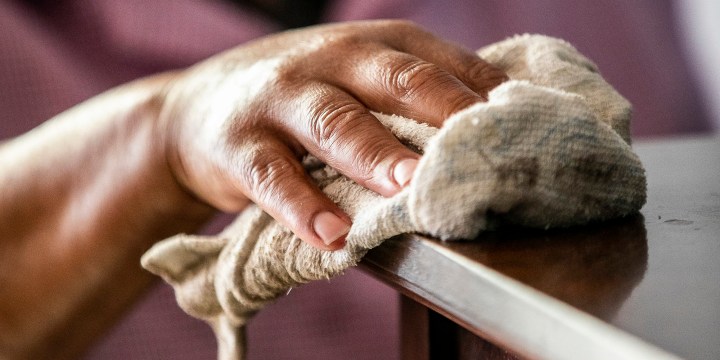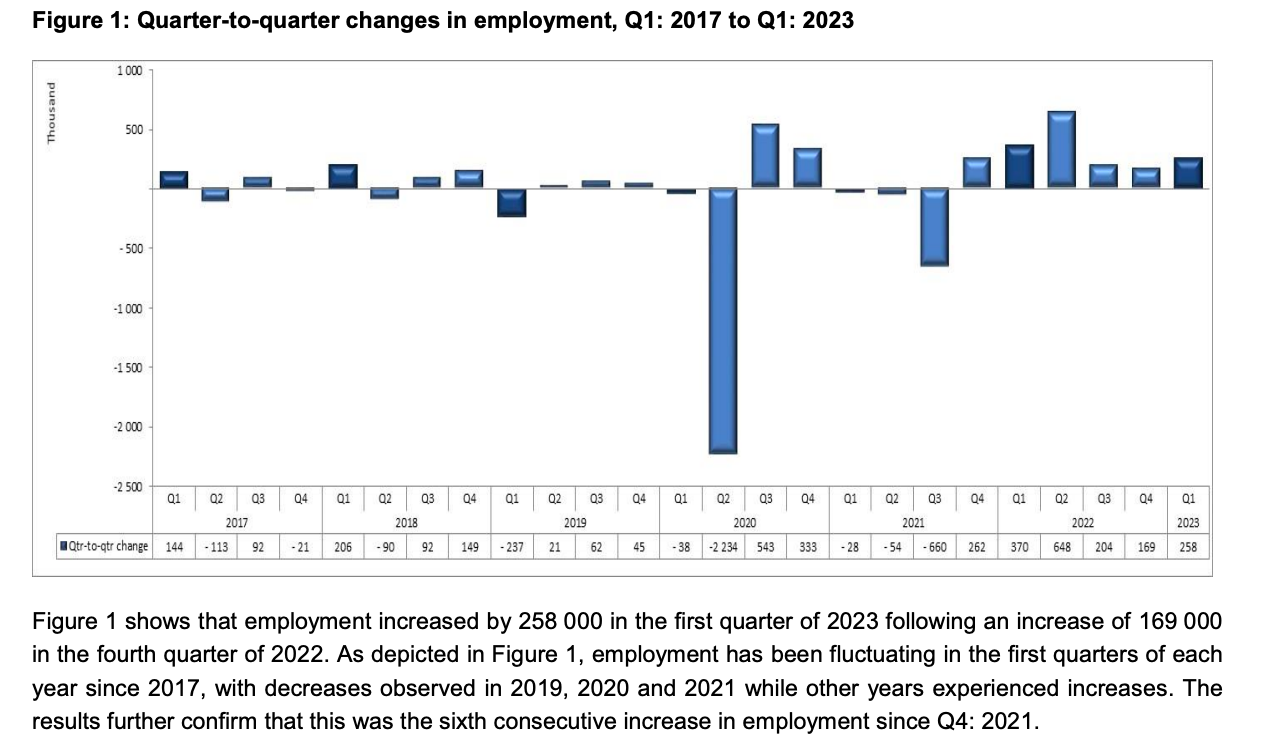TERRIBLE TRIFECTA ANALYSIS
SA’s unemployment rate rises to 32.9%, with 85,000 domestic worker and gardener jobs shed

South Africa’s unemployment rate rose to 32.9% in the first quarter of 2023 from 32.7% in the last quarter of 2022. One worrying trend is that 85,000 jobs were lost in private households, which would be domestic staff and gardeners. This suggests middle-class households are financially strained while others are emigrating.
Load shedding is job shedding; it’s as simple as that. All the talk by ANC mandarins about confronting the terrible trifecta of unemployment, poverty and inequality is pie in the sky if Eskom can’t provide reliable power.
Data unveiled on Tuesday by Statistics South Africa (Stats SA) showed the unemployment rate edged up to 32.9% in Q1 of this year compared with 32.7% in the last quarter of 2022 when the economy contracted by 1.3%.
While the number of employed persons rose by 258,000 to 16.2 million in the first three months of the year compared with the previous quarter, the unemployment rate still increased because of a flow from the “not economically active category”.
“It was observed that a large number of persons moved from the ‘not economically active’ category to ‘employed’ and ‘unemployed’ statuses between the two quarters, which resulted in an increase of 0.2 of a percentage point in the unemployment rate to 32.9%,” Stats SA said.
Considering the sheer scale of the power crisis which is shredding economic growth while simultaneously fuelling inflation because of the costs businesses incur to keep the lights on — a classic case of what economists term stagflation — one supposes that the number could have been worse.
But an official unemployment rate of almost 33% remains a national tragedy and the data highlighted a worrying trend for some of the country’s poorest and most vulnerable workers — a decline in employment in private households, which would mean domestic workers and gardeners.
“Employment gains were observed in the formal sector (up by 209,000), the informal sector (up by 107,000) and agricultural sector (up by 27,000), while losses were observed in private households (down by 85,000) in Q1 2023,” Stats SA said.
Indeed, of the five out of 10 broad sectors that had job losses in Q1 2023 compared with the previous quarter, private households had by far the most, with the 85,000 figure dwarfing trade, which had the second-highest losses at 28,000.

Domestic worker Linah Mphuthi in one of the houses she cleans for a living, 25 November 2009. (Photo: Gallo Images / Foto24 / Herman Verwey)
The private household job losses amounted to a 7.5% decline compared with the previous quarter.
Madam, it seems, is dispensing with Eve. This probably means that middle-class households that are under strain are cutting out the amenities of domestic service. It may also be a consequence of emigration. When you pack your bags for Perth or Toronto, you can’t take your domestic worker and gardener with you.
Also of concern is the continued rise in youth unemployment, which now stands at 62.1%.
The unemployment rate, according to the expanded definition — which includes discouraged jobseekers — fell by 0.2 of a percentage point to 42.4% in the quarter. This is still an utterly shocking figure.
“This points to longer-term, structural issues within the local economy as it is difficult to reincorporate and entice discouraged work-seekers back into the labour force,” said Casey Delport, an analyst at Anchor Capital, in a commentary on the data.
“Of further concern is the long-term unemployment rate (ie, those unemployed for a year or longer), which has steadily increased over the past decade — from 65.5% in Q1 2013 to 77.2% in Q1 2023.
“Regardless of the exact details in the data, typically, in the domestic economy, material job creation has only occurred when GDP growth approaches 3% per annum. Currently, businesses remain under significant pressure from the ongoing effects of load shedding, which is also weighing on jobs and the unemployment data.”
The bottom line is that with almost no prospects of economic growth this year, largely because of the power shortage, rising interest rates and stubbornly high rates of inflation, South Africa is simply not creating jobs in a meaningful way. The terrible trifecta will continue to fray the social fabric, and a cold and dark winter is looming. DM/BM
Note: In the original version of this article, there was a typo, which we have now corrected.


















I guess that in the header where you say immigrating (moving to South Africa) you want to say emigrating (leaving South Africa).
Immigrating = coming INTO a country
Emigrating = LEAVING a country.
This is learned at school.
These anc government policies blow my mind. Hypothetically speaking, in a household with say 3 people of economically active age, what would you rather have 3 people gainfully employed earning R3000/m, or do you want 1 person employed earning R5000/m and the other 2 sitting at home because their previous employer could not afford the R5000/m minimum wage.
This is the difference between anc policy and the Asian Tigers policies. The anc seems to think that having 35 million people on welfare is a badge of honour.
There is a typo in the linking paragraph m, “immigrating” instead of “emigrating”. The correct word is used in the main article.
There is a different side to this issue resulting from the COVID lockdown during which we didnt have cleaners. Many home owners found that a full time cleaner is an onerous responsibility which doesn’t provide adequate ROI (with wages rising exponentially and not to mention the hidden and incalculable costs of cleaners). We cleaned our own houses and realised that the pleasure of having ones home to oneself far outweighs any possible benefits and that cleaning isn’t such a big deal anyway.
For me, the effect of a hardening of unemployment in the youth category and long termer category combined with coming food and delivery price increases off the back of increased load shedding means huge social unrest this winter.
Hungry unemployed youths milling around with no hope means KZN style conflagrations are on the way, for sure. And it will also be in areas previously thought to be stable.